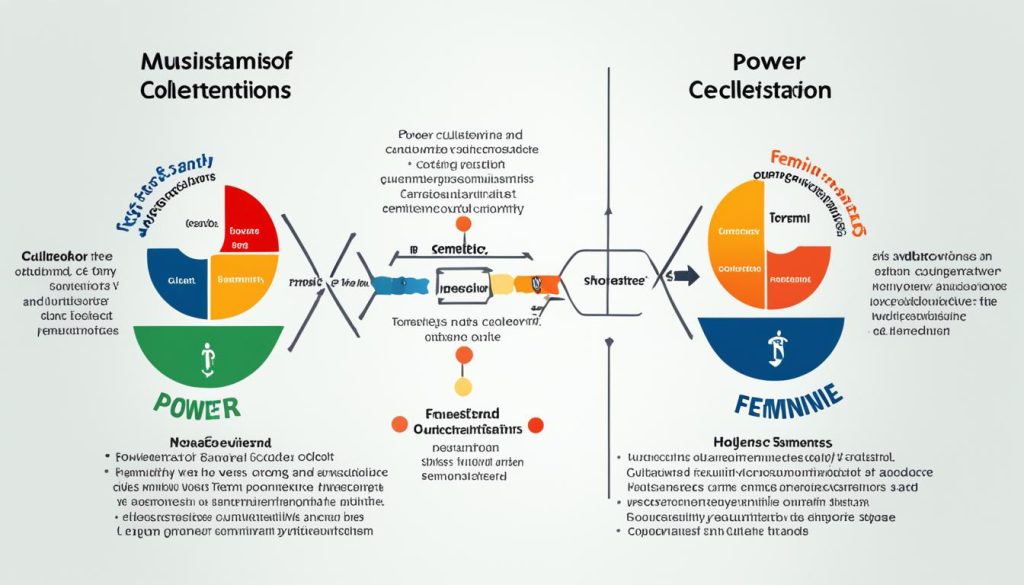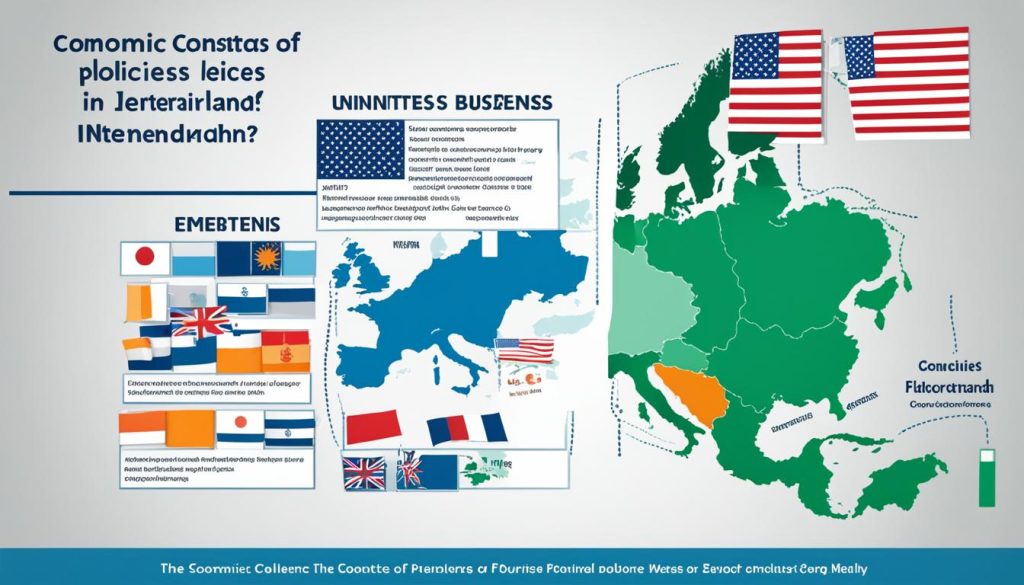Understanding international business practices means knowing how cultures differ. A look at Netherlands vs Ireland vs USA corporate cultures shows us various ways of working and doing business. This knowledge is critical for companies wanting to succeed globally.
Introduction to International Business and Cultural Interactions
As global business operations grow, they meet different cultural norms and practices. It is crucial for organisations to navigate with cultural competence. They must understand the global marketplace’s diverse cultural backgrounds. This understanding helps enterprises in the complex world of multicultural workplace dynamics.
Today’s world needs a balance between local customs and a global strategy. We look at how cultural intelligence is key for businesses that operate internationally. It’s also about having empathy when creating multinational partnerships. Recognising cultural differences is just the start. It’s about how these differences affect business at every level.
Significance of Cultural Awareness in Global Business
To succeed in global business operations, companies must understand and adjust to cultural differences. This prevents misunderstandings that could harm negotiations and partnerships. Successful international companies use cultural intelligence in their strategies. They ensure their actions respect local ways and traditions. This cultural awareness helps them deal with the complex aspects of international trade.
Overview of Multicultural Dynamics in Professional Environments
The complexity of multicultural workplace dynamics is seen in daily interactions and decision-making. Being culturally competent means adapting to diverse work environments. It leads to more inclusive and vibrant workplaces. As business networks grow, respecting cultural diversity becomes essential. It is not just good manners; it’s crucial for success in global business.
Business Practices in the Netherlands, Ireland, and the USA
It’s key for any international company to understand different business practices. The Dutch, Irish, and American ways of conducting business offer unique insights. These insights help in making connections across cultures.
In the Netherlands, being on time and speaking your mind are highly valued. The Dutch focus on teamwork and making decisions together. This shows their commitment to equality and working as one community.
In Ireland, it’s all about building strong relationships. The Irish value a friendly chat, being open to change, and meeting new people. These qualities are central to creating lasting and positive business ties.
On the other hand, the American business environment is fast and to the point. Americans make decisions quickly and aim straight for their goals. They value getting things done effectively and seizing the initiative to solve issues right away.
- Dutch business etiquette: punctuality, directness, consensus in decision-making
- Irish corporate conduct: relationship-building, friendly communication, networking
- American business environment: quick decision-making, assertiveness, result-oriented
These differences highlight why cultural awareness is crucial in global business. Each area comes with its own rules and expectations. Understanding these can greatly impact the success of international dealings.
Understanding Hofstede’s Cultural Dimensions Theory
Exploring Geert Hofstede’s Cultural Dimensions Theory opens up insights into international business. It covers six dimensions—power distance, individualism vs collectivism, uncertainty avoidance, masculinity vs femininity, long-term orientation, and indulgence. These show how culture shapes global commerce.
Power-Distance Index Across Different Societies
Power distance shows how societies handle inequalities in organisations. The Netherlands has low power distance, favouring flat structures and open talks. In contrast, the United States prefers clear power hierarchies, with a top-down approach in business settings.
Individualism Versus Collectivism in Business Relations
Individualism and collectivism look at valuing personal success or group welfare. America’s strong individualism advocates for personal effort and competition. Conversely, Irish culture values the collective, focusing on group well-being and cooperative achievements.
Managing Uncertainty in International Dealings
Uncertainty avoidance deals with being comfortable with ambiguity and risk. Firms that understand uncertainty avoidance can better adapt their strategies. They align their business plans with local comfort levels concerning risk.
Gender Roles and Their Impact on Global Business
The masculinity vs femininity dimension talks about gender roles in business. Cultures vary in how men and women participate in work. For instance, the US values assertiveness. Other cultures might value a more nurturing and consensus-driven approach.
Short-Term Versus Long-Term Orientations in Corporate Strategies
Long-term orientation looks towards the future over present gains. Short-term oriented societies hold traditions and present conditions highly. Knowing a culture’s orientation helps in making apt corporate strategies and setting achievable goals.
Indulgence Versus Restraint in Consumer Cultures
The indulgence versus restraint dimension influences consumer actions. Indulgent markets offer different business possibilities than restrained ones. In restrained societies, spending is usually more careful and thought out.
Language and Communication Styles in Business
Understanding languages plays a key role in global business. It’s not just about words, but also about sending and understanding messages across cultures. This makes communication a vital tool in overcoming language barriers and ensuring mutual understanding.
Navigating Through Linguistic Differences
Clear communication in global business is complex. It involves understanding local language nuances, not just translating words. Companies face many language challenges.
Overcoming these helps build strong global links. This opens doors to easier trade and cooperation worldwide.
Verbal and Non-verbal Communication Preferences
Success in international business is not based on words alone. Understanding non-verbal signals is also essential.
Gestures, facial expressions, and how we move communicate much across cultures. Different cultures have their own ways of using verbal and non-verbal signals. This affects how messages are received and understood internationally.
- In regions like the USA and Ireland, where English is dominant, subtle language differences matter.
- The Netherlands prefers brevity in communication, showing a value for clear, direct exchanges.
- In Asia and the Mediterranean, communication is often indirect, with more focus on context and non-verbal cues.
Training staff to handle language differences is key. It helps companies move beyond language hurdles. It also shows respect for cultural nuances, aiding in effective international engagement.
Cultural Nuances and Social Etiquette in the Workplace
Knowing the finer points of workplace etiquette is vital in international business. This includes understanding both the equal meeting style of the Netherlands and the hierarchical approach of the USA. It’s crucial for creating a positive and effective work environment. Being mindful of work-life balance across cultures also helps in honouring local customs and religious practices that might affect schedules.
Meeting and Greeting: Understanding the Rituals
First impressions in business meetings across the world are crucial. In the Netherlands, everyone’s input is valued equally, showcasing their egalitarian approach. They use handshakes to show this. In contrast, in the USA, meetings start by highlighting each person’s role, setting a hierarchical tone.
Being adaptable to these practices shows cultural awareness and professionalism. It is vital for businesses to train their staff well in these areas. This demonstrates respect for cultural diversity.
Regional Work Week Variations and Religious Considerations
Companies operating globally must navigate regional work week differences and religious holidays carefully. They have to find a good balance, respecting cultural traditions while keeping up productivity. This consideration helps in running smooth operations.
- Getting to know the local holiday calendar is not just practical. It’s also a sign of respect.
- It’s essential to plan around these dates to prevent issues.
- Being flexible with schedules can greatly improve respect and success in multi-cultural teams.
Respecting these cultural details leads to a more inclusive work atmosphere. It shows that an organisation values cultural diversity and manages work-life balance thoughtfully.
Negotiation Tactics and Conflict Resolution
In today’s global market, mastering negotiation and conflict resolution is crucial. Success hinges on understanding both common strategies and cultural subtleties. Adapting your approach to fit cultural norms can turn a deadlock into a win.
Tailoring Approaches to Suit International Counterparts
When dealing with worldwide partners, it’s essential to navigate with cultural sensitivity. Knowing when to be direct or consensual is vital. Being flexible, yet focused on your goals, can lead to balanced outcomes.
Cultural Norms and Their Effect on Problem-Solving
Respecting cultural norms is key in resolving disputes. The type of problem and the societal norms of those involved guide resolution tactics. This varies by country, affecting both negotiation pace and style.
- Direct and fast-paced negotiation strategies are often associated with American business culture.
- The British might employ a more indirect and humorous approach.
- And Australians may adopt an approach marked by a relaxed conversational style.
Viewing negotiations through these varied cultural lenses helps in achieving effective solutions. This is the true test of cross-cultural negotiation skills.
Corporate Social Responsibility and Environmental Awareness
The Netherlands leads by example in combining a strong economy with sustainable practices. It puts corporate social responsibility at the heart of its businesses. This commitment is evident in the Dutch way of doing business, focused on ethical practices.
Ethical Practices and Community Involvement in the Netherlands
The Dutch economy is known for its strong ethical standards, especially in protecting the environment. Companies in the Netherlands work hard to lessen their impact on nature. They aim to improve social wellbeing too. This is more than just following laws. It’s about valuing trade and environment equally.
- Redefining corporate success beyond financial gains to include positive societal impacts.
- Actively seeking resourceful ways to implement renewable energy and reduce waste.
- Supporting social programs that contribute to community development and social equity.
- Participating in global compacts that uphold environmental conservation and sustainability goals.
In the Netherlands, being responsible means caring for the environment as part of business. This mix of ethics and good business has become a model for others. It shows how companies can be responsible and successful at the same time.
Dutch companies have gained respect and competitiveness by focusing on the environment in their business. Corporate social responsibility shows us that business and environmental care can work together. This is the Dutch way.
Adaptability in Global Business Ventures
When going global, understanding different cultures is key. Successful companies know adapting to cultural differences leads to success in international business expansion. This ability to change operations to fit local cultures is crucial.
Learning from Successful International Expansions
There are many stories of businesses that have adapted well abroad. For instance, some international restaurants have changed their menus to match local tastes. This strategy of adjusting products to local preferences has helped them succeed in diverse markets.
Analysing the Pitfalls of Misreading Cultural Cues
Not understanding local culture can hurt businesses. Avoiding these mistakes requires changing strategies to be more sensitive. By learning from past mistakes, businesses can avoid alienating customers.
- Identifying key cultural drivers that influence consumer behaviour in new markets.
- Implementing cross-cultural training for employees to foster an adaptable and sensitive workforce.
- Conducting thorough market research to inform product development and marketing campaigns.
Adaptability is essential in global business, not just an extra. It helps companies navigate the complexities of international markets with skill and care.
Economic Policies and the Ease of Doing Business
Understanding economic policies and rules is key for businesses thinking about going global. Different countries have their own ways to support or control business. Let’s look at how the Netherlands, Ireland, and the USA do this. We’ll see how their rules affect businesses and either make it easier or harder to operate there.
Comparing Regulatory Frameworks in the Netherlands, Ireland, and the USA
In the Netherlands, businesses find a balance between a strong logistical setup and social welfare. This not only helps businesses but also makes sure they do good for society. Being a main entry point to Europe also gives the Netherlands big advantages for business logistics.
In Ireland, the country is becoming more popular for businesses thanks to its supportive laws. These laws, which include good tax policies and lots of skilled workers, help businesses start and grow. Ireland makes it easier for businesses to overcome common challenges when setting up or growing.
On the other hand, the USA is known for its freedom in business, with less government rules. This freedom helps business and innovation thrive but comes with its challenges. Dealing with these challenges is part of the adventure and hardness of doing business in the USA.
Knowing the differences in these countries’ economic policies helps companies plan their international strategies. Whether it’s using the Netherlands’ location, Ireland’s supportive environment, or the competitive edge in the USA, companies can get ready for the challenges of doing business in these places.
The Infusion of Culture in Corporate Governance
The relationship between a company’s governance and societal culture shows big differences in how businesses run worldwide. This part looks at these differences. It explains how they affect company structures. Also, it shows how they mirror the unique norms of each country.
Egalitarianism and Hierarchical Structures in Different Economies
When studying corporate governance, it’s key to see the range from equal to top-down management styles. The Netherlands is known for its flat organisational structure. This encourages open talks and group decision-making. This model fits well with Dutch ideals. It also connects to the wider call for more transparency and responsibility in corporations.
In contrast, the US favours a more top-down approach. This can lead to faster decisions and clear leadership. This method reflects the energetic nature of American businesses. Yet, it’s quite different from the consensus-based style in Dutch firms.
Understanding corporate governance’s nuances is vital as our world becomes more connected. Whether leaning towards equality or hierarchy, a business’s culture greatly influences it. This highlights the importance of being culturally savvy in a global market.
Cultural Taboos and Faux Pas in International Meetings
Joining international meetings means learning about international business etiquette beforehand. This prepares you for successful talks by respecting cultural sensitivities. Understanding cultural taboos and steering clear of faux pas is vital. It’s not just good manners—it’s a smart move for business partnerships.
In the Netherlands, treating everyone formally is expected until they say otherwise. This respect matters a lot. Being on time for meetings shows you value Dutch principles. It helps in working together well. In the U.S., meetings are quick and to the point because time is precious. They like things efficient and focused.
Irish business tends to mix informality with professionalism. A firm handshake and friendly smile are key but don’t overlook formalities. Catching the nuances in Irish meetings keeps things professional.
Some meeting rules are global. For example:
- Being on time shows you respect others.
- Knowing the agenda well shows you’re serious.
- Avoid hot-button topics unless you’re very knowledgeable.
Mastering business etiquette seems tough because of its many details. Yet, dedicating time to grasp international business etiquette is worth it. This way, you avoid cultural taboos and can become a smart global businessperson. Understanding the subtle differences in meeting protocols is the key. It leads to lasting and valuable global connections.
The Role of Trust and Happiness in Business Cultures
In global commerce, trust and happiness in society deeply affect businesses. Trust helps daily operations and strategic plans in organisations. It helps partnerships and teamwork grow. Happiness shows the well-being of a society. It leads to a lively and productive business world.
The Correlation Between Societal Trust and Business Ease
Studies show a clear link between societal trust and business ease. Where trust is common, businesses feel secure and predictable. This lets them work faster and simpler. They don’t need as many checks or contracts.
Impact of National Happiness on the Business Environment
National happiness greatly affects the business scene. When a society is content, it means peoples’ basic needs are met. This creates a solid ground for businesses. A happy society helps a manageable and appealing business culture. It leads to innovation, growth, and a strong economy.
The connection between trust, happiness, and business is crucial. Businesses should focus on building trust and ensuring people are content. This is key for success in the global market.
Dress Codes in International Business Settings
Globalisation makes it vital to know the international dress codes. They vary a lot around the world. The Dutch business fashion blends practicality with a smart look. It’s shaped by the country’s culture and how people there travel.
In the Netherlands, knowing what to wear in business is key. It’s not just about clothes. It shows you value their work culture. This can impress Dutch colleagues and partners.
Dutch Business Attire Expectations
Functional yet fashionable clothing is popular in the Netherlands. This is because many people bike to work. So, clothes need to be practical but still look professional. Both men and women choose outfits that fit this need.
- A smart, tailored fit is preferred for suits, with an emphasis on comfort for daily commutes.
- Conservative colours such as navy, grey, and black dominate the professional palette, allowing for a seamless transition from boardroom to bicycle.
- Accessories are typically understated, with practicality valued over ostentation.
Grasping Dutch business dress subtleties can help in making better connections. It’s wise to research a company’s culture beforehand. Dress standards can range from casual to very formal, depending on the place.
When you’re off to international meetings, knowing corporate attire guidelines is key. Adapting to Dutch business wear shows respect. It helps build understanding and cooperation in an international setting.
Decision Making and Consensus in Team Dynamics
In the Netherlands, effective team decisions are made together. Participatory decision-making is key in their culture. Meetings are not just for talking. They are where everyone’s ideas are considered carefully to reach consensus in business.
Dutch meetings show a strong commitment to letting everyone speak. This leads to better ideas and solutions. It’s not just about agreeing. It’s about making smart choices with the help of all team members.
The Dutch Preference for Inclusivity and Debate During Meetings
Dutch meeting culture values respectful discussions and looking at all sides. Open chats with lots of viewpoints are common in their businesses. This way of making decisions shows a deep respect for fairness, seen across Dutch society.
Their meetings take their time but aim for the best results. They believe in fairness and logic. This creates a business environment where everyone stands behind the decisions made.
If you’re working with Dutch companies, it’s important to get how they make decisions. Understanding their participatory decision-making helps in working well together. It opens doors to strong partnerships by respecting their way of reaching consensus in business.
Corporate Entertaining and Hospitality Customs
Understanding business entertaining, hospitality customs, and cross-cultural corporate events is vital for global businesses. These companies aim to build strong connections worldwide. Different countries have unique ways of seeing corporate entertainment and hospitality. This greatly influences forming and maintaining business relationships.
Unique Practices in the Netherlands, Ireland, and the USA
Every country has its own style. This shapes how they handle business and social interactions within the corporate world.
- The Netherlands: Dutch corporate culture values brief, efficient meetings more than long meals or casual socialising. Hospitality, when offered, respects everyone’s time and schedules.
- Ireland: Ireland finds a middle ground, mixing efficiency with friendliness. Social events are key for strengthening business ties here. Irish hospitality helps build deeper professional relationships.
- The USA: The US combines formal and genuine hospitality. Entertaining in business is crucial for building strong professional connections. Events aim to create memorable experiences that go past formal meetings.
The key to cross-cultural corporate events is grasping these regional nuances. That way, business goals are achieved while honouring each country’s social norms. Whether it’s a board meeting in Amsterdam, a dinner in Dublin, or a cocktail party in New York, every event shows the deep-rooted hospitality customs essential for international business success.
Conclusion
Exploring business in the Netherlands, Ireland, and the USA shows how culture affects international work. Knowing about each country’s customs is key for global trade success. Respecting these practices helps in building strong business connections.
Being skilled in working with different cultures is an edge. Companies that manage this can smoothly deal with global trade challenges. Focusing on global strategy shows the value of understanding cultures. It’s about creating trust in diverse business settings.
Companies that adapt to cultural differences lead in the global economy. They see cultural variety as a chance for growth, not a problem. Such an approach boosts financial success and builds a better world.
















